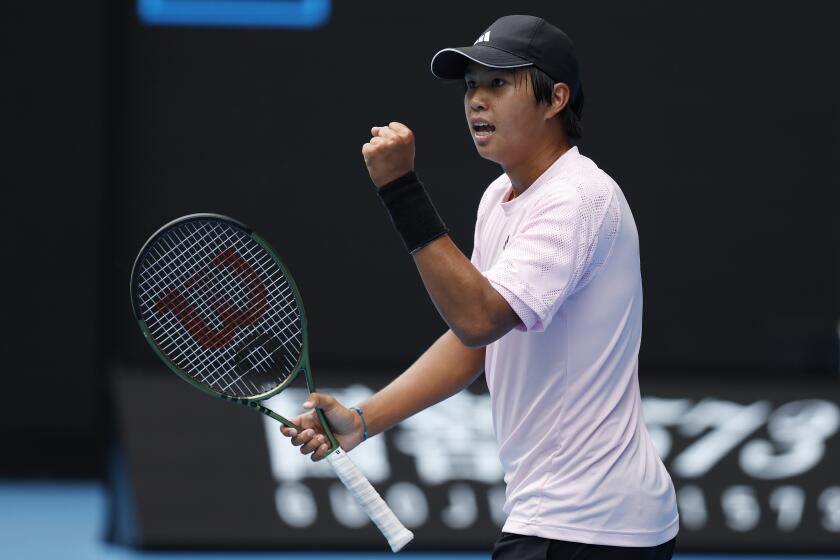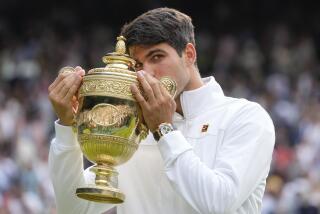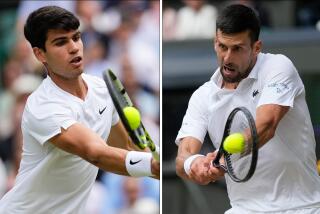‘It’s unbelievable.’ Carlos Alcaraz beats Novak Djokovic in five sets to win Wimbledon
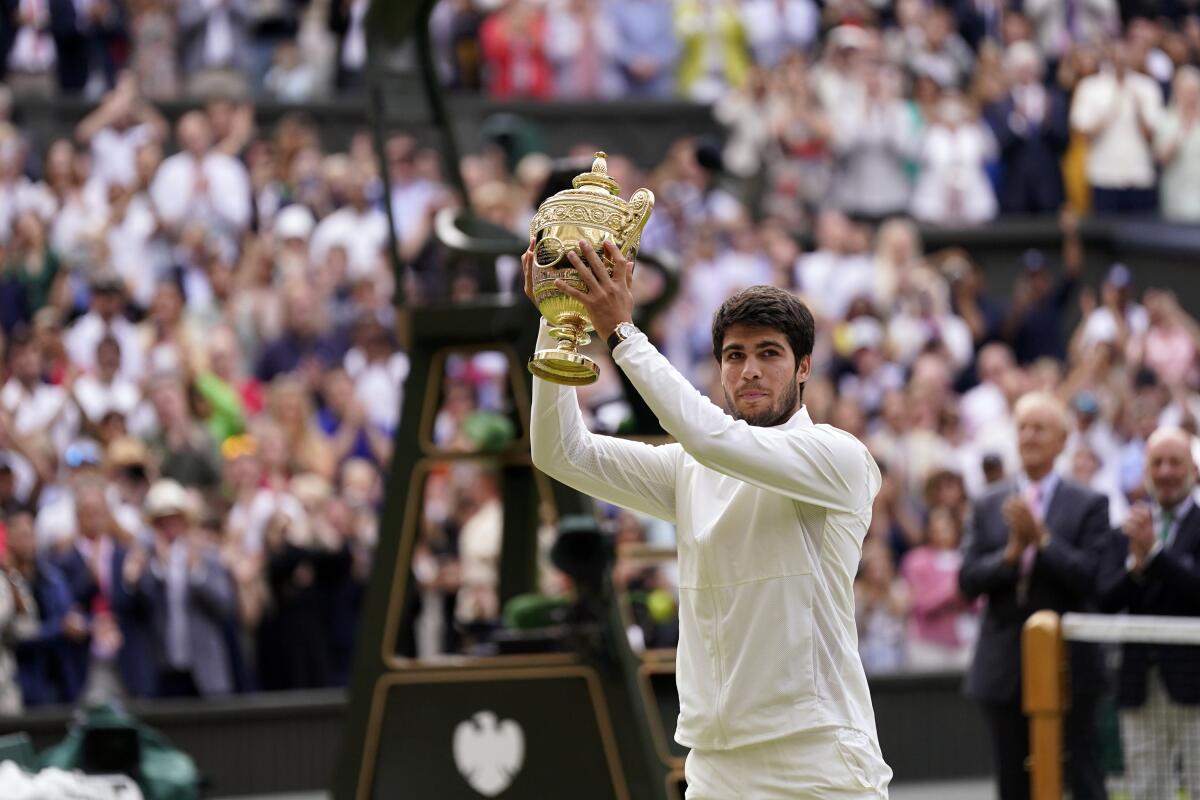
- Share via
WIMBLEDON, England — Carlos Alcaraz said he wanted another shot at Novak Djokovic. Said it would make winning a Wimbledon championship more special. Well, Alcaraz got his chance to face Djokovic. And he beat him.
Alcaraz put aside a poor start and surged down the stretch to end Djokovic’s 34-match winning streak at the All England Club by edging him 1-6, 7-6 (6), 6-1, 3-6, 6-4 in an engaging, back-and-forth final Sunday, claiming his first title at Wimbledon and second Grand Slam trophy overall.
The No. 1-ranked Alcaraz prevented No. 2 Djokovic from collecting what would have been a record-tying eighth title, and fifth in a row, at the grass-court tournament. Djokovic also was kept from earning a 24th career major.
“Playing a final against a legend of our sport — for me, it’s incredible,” said Alcaraz, who was competing in just his fourth career event on grass.
“I have to congratulate Novak. It’s amazing to play against him. What can I say about him? It’s unbelievable. You inspire me a lot. I started playing tennis watching you,” Alcaraz said, then joked: “I mean, since I was born, you already were winning tournaments.”
Marketa Vondrousova came back to win each set during a 6-4, 6-4 win over Ons Jabeur, becoming the first unseeded woman to win Wimbledon.
That’s not exactly accurate. Still, instead of Djokovic, a 36-year-old from Serbia, becoming the oldest male champion at Wimbledon in the Open era, Alcaraz, a 20-year-old from Spain, became the third-youngest. The age gap between the two was the widest in any men’s Slam final since 1974.
So Alcaraz had youth on his side, which he also did, of course, when they met at the French Open last month. That one was extraordinary for two sets before Alcaraz cramped up and faded. This time, he had the stamina and the strokes to get past Djokovic.
“You never like to lose matches like this. I guess when all the emotions are settled, I have to still be very grateful because I won many, many tight and close matches in the past here,” said Djokovic, whose last loss at Wimbledon was in 2017.
“I lost to a better player,” said Djokovic, who paused to wipe away tears, “so I have to congratulate him.”
Alcaraz is faster and capable of more power — serves topping 130 mph, forehands topping 100 mph — but Djokovic is equipped with an abundance of talents and so much muscle memory. He’s been there, and done that, in ways Alcaraz, for now, can only dream of.
But if this victory on a windy and cloudy day at Centre Court, where Djokovic last lost in the 2013 final, was any indication, Alcaraz is on his way to achieving quite a bit himself.
Still, this is all relatively new to him: Djokovic’s record 35th Grand Slam final was Alcaraz’s second.
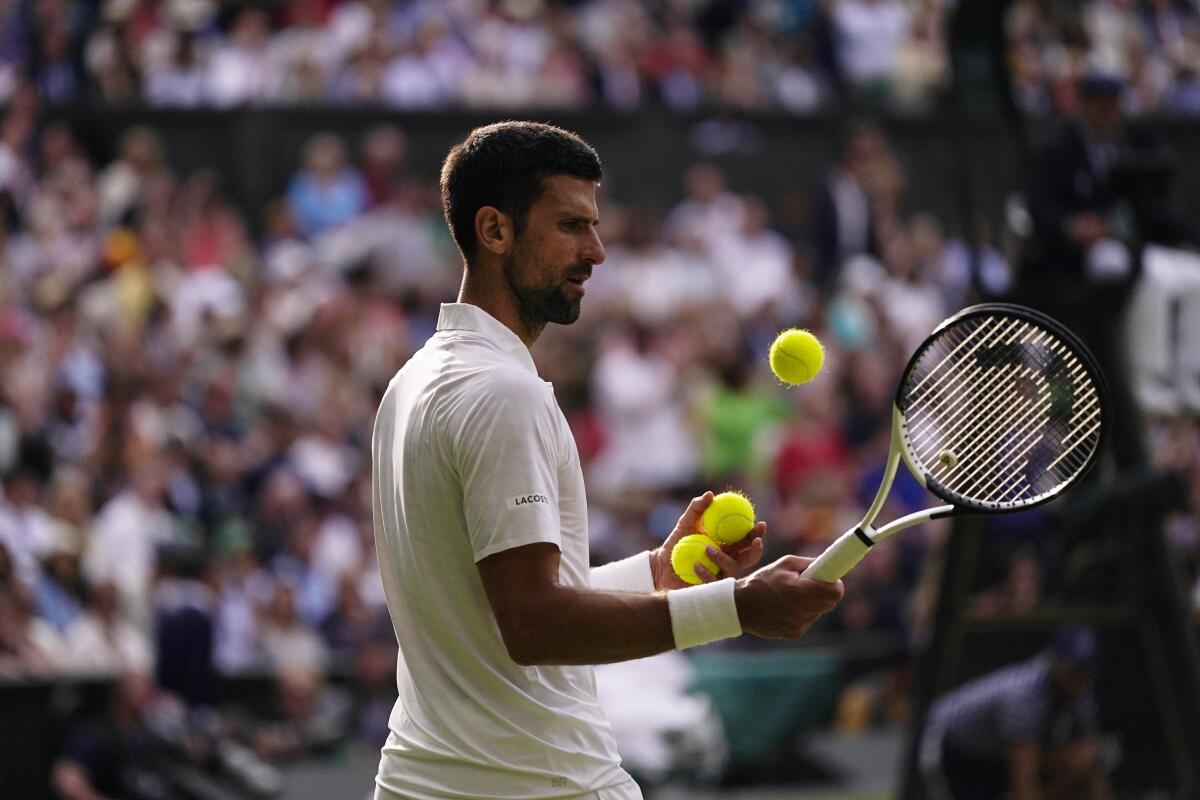
Yet it was Alcaraz who won a 32-point, 25-minute mini-masterpiece of a game on the way to taking the third set. It was Alcaraz who was not intimidated when Djokovic forced things to a fifth set.
And it was Alcaraz who moved out front for good by breaking to go up 2-1 in the fifth with a backhand passing winner. Djokovic, who fell during the point but quickly popped back up, reacted by slamming his racket into the net post, letting go on impact. He destroyed his equipment and earned a code violation from chair umpire Fergus Murphy.
They would play on for 24 more minutes, bringing the total to more than 4 1/2 hours, but Alcaraz never relented, never gave way. And it was Alcaraz, not Djokovic, who covered his face and rolled in the grass after the final point, then received the gold trophy.
“What quality in the end of the match,” Djokovic told Alcaraz during the post-match ceremony. “You deserve it, absolutely.”
Alcaraz possesses a sledgehammer of a forehand, one he unleashes in such a manner as to make an observer believe every ounce of strength, indeed every fiber of his being, is invested in each swing. The smack of the racket, and his “Uhhh-ehhh!” exhale of exertion — along with the gasps of impressed onlookers — reverberated around the arena Sunday.
That’s not to say, of course, that Alcaraz’s attributes end at that big forehand. He is so much more than that, displaying as varied an all-court game as possible, which is why stardom is predicted of him. He does everything well, including well-disguised drop shots that helped him get back into the thick of it in the second and third sets.
Djokovic, of course, already has achieved greatness, spending more weeks at No. 1 than any man or woman in the half-century history of the computerized rankings and accumulating those 23 Grand Slam triumphs — one more than Rafael Nadal and three more than Roger Federer, the only man with eight Wimbledon titles.
After taking a break from tennis, Learner Tien returned with a new vigor that distinguishes him as someone to watch among pro tennis hopefuls in Southern California.
So often on Sunday, Djokovic would hustle and stretch and slide nearly into the splits to get Alcaraz’s apparent point-ending shots back over the net in ways no one else could.
Things began to shift, though, at 4-all in the second set. Djokovic slipped on a worn patch behind the baseline under the Royal Box, flinging his racket away as he fell. At the next changeover, Djokovic flexed one leg by bending it over the other. Before heading back on court to resume play, he plopped his left heel on the net for additional stretching. Soon, his legs were not providing quite the same coverage they had been, the force of his forehand was reduced.
They would head to a tiebreaker, Djokovic’s dominion: He had won all six such set-enders he played at Wimbledon leading up to the final, and 15 straight in Grand Slam action, dating to the Australian Open.
This time, Djokovic had a set point while ahead 6-5 in the tiebreaker, sparking the day’s first chants of his two-syllable nickname from his backers: “No-le! No-le!” But he put a backhand into the net to make it 6-all, and as the players switched sides, a competing chorus of “Car-los! Car-los!” emerged.
Another backhand into the net from Djokovic put Alcaraz within a point of the set. He converted by striking a backhand passing winner off the return of a 118 mph serve, then held the pose of his follow-through. As people in the stands rose to roar, Alcaraz spun around with his right hand to his ear, soaking in the moment.
Two hours and two sets in.
One set each.
Now it was a match.
Now this began to feel memorable.
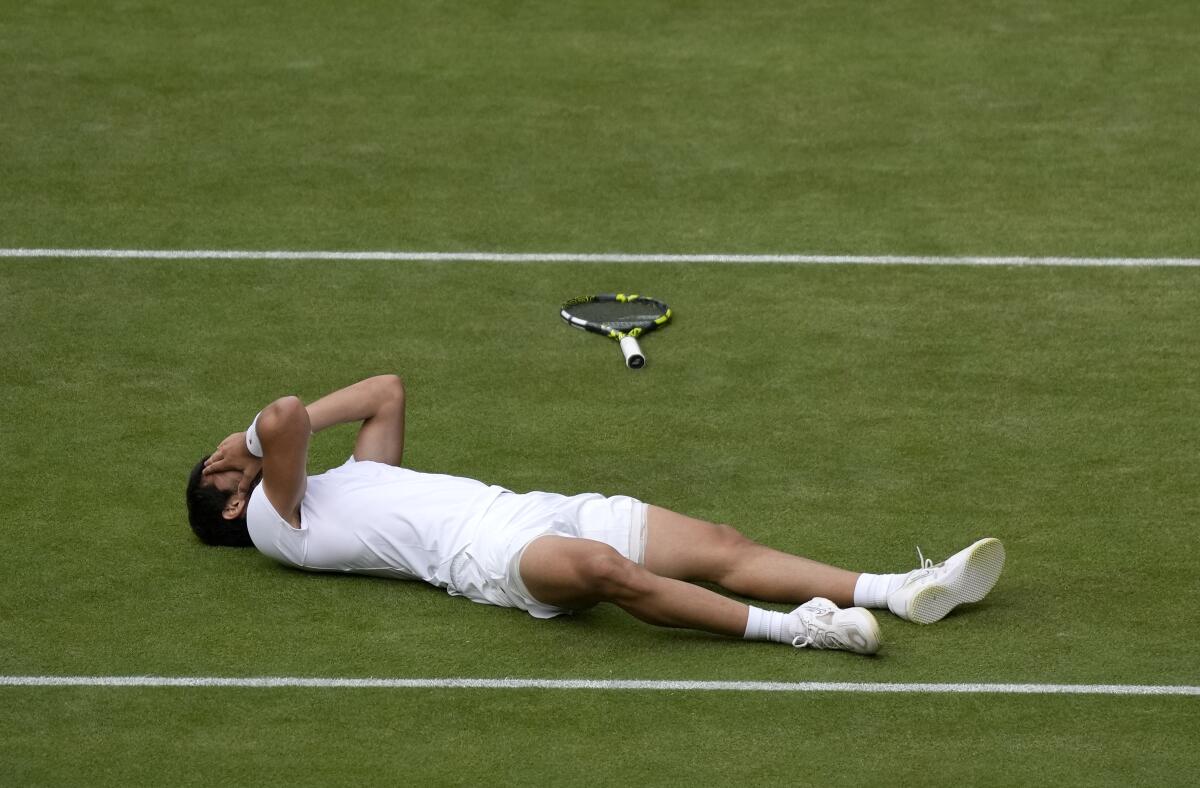
The fifth game of the third set might have been worth the high price of admission, in and of itself. Neither man wanted to bend. Neither wanted to cede a thing. It was one game, yes, but it felt far more meaningful than that.
When Djokovic slapped a forehand into the net to give Alcaraz a break — one of five in the match, more than the three combined that Djokovic’s previous six opponents managed across 103 service games over the last two weeks — and a 4-1 edge in the set, the Spaniard threw his head back and screamed, “Vamos!”
Djokovic headed to the locker room with a white equipment bag slung over his right shoulder. He’s used these sorts of intermissions to gather himself and shift momentum and, sure enough, he pushed this terrific match to a fifth set.
One of several reasons to like Djokovic’s chances at that juncture: He went into Sunday with a 10-1 record in five-setters at Wimbledon and 35-9 at all majors.
Those matches, however, were in the past.
Alcaraz is the future.
“I’ve learned really, really fast,” said Alcaraz, who got a hug from Spain’s King Felipe VI afterward, “and I’m really, really proud.”
More to Read
Go beyond the scoreboard
Get the latest on L.A.'s teams in the daily Sports Report newsletter.
You may occasionally receive promotional content from the Los Angeles Times.

